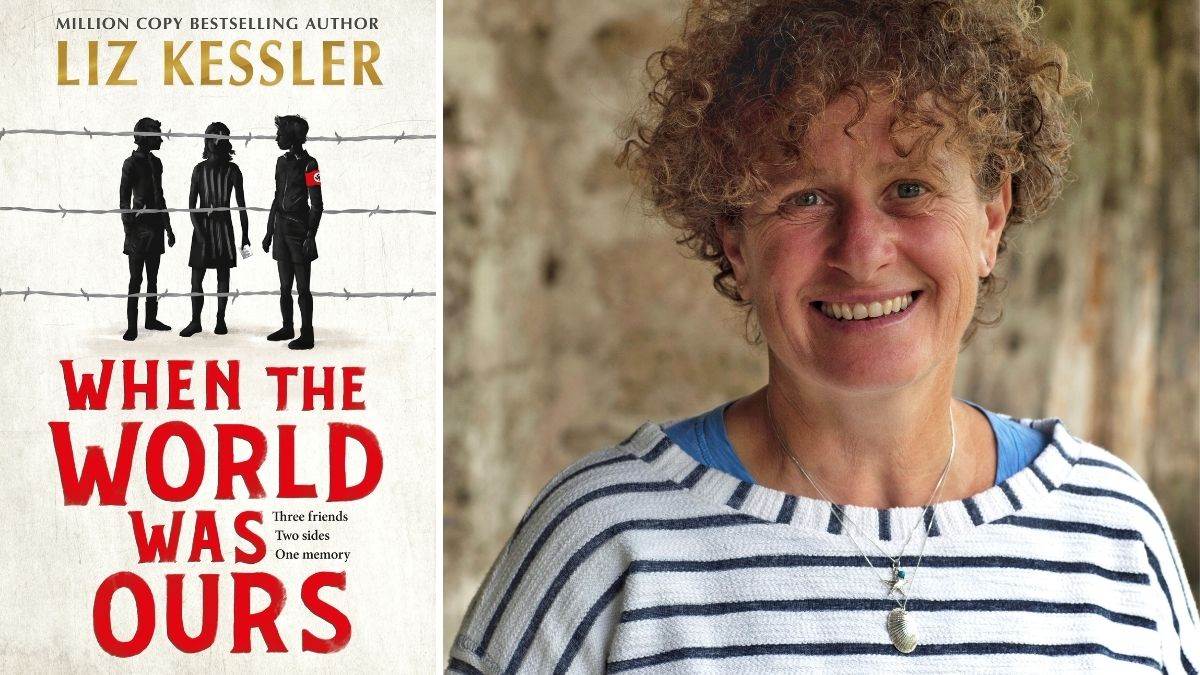Five tips for talking to young people about the Holocaust
Published on: 27 January 2021 Author: Liz Kessler
27 January marks Holocaust Memorial Day, the anniversary of the liberation of Auchwitz-Birkenau. It is a a time to remember the millions of people who lost their lives to the Holocaust, and to reflect on the atrocities committed by Nazism.
For young people learning about the Holocaust for the first time, the subject can be emotionally overwhelming. When The World Was Ours author Liz Kessler shares five tips for talking about this dark period of history with young people in a meaningful and supportive way.

Prepare yourself
Before approaching such a vast and difficult subject with a young person, try to educate yourself on the subject as well as you can so you are ready with answers and insights. There are some great websites out there that can help you do this, such as the Holocaust Educational Trust at www.het.org.uk or the International Holocaust Remembrance Alliance at www.holocaustremembrance.com. It is also worth mentioning that you should prepare yourself emotionally. When looking into the events of the Holocaust there are so many facts that are upsetting beyond our imagining and it will help you to be ready for the young person’s emotional response if you have ensured that you are as emotionally prepared as possible yourself.
Be honest and gauge it right for the individual
Being truthful about the facts whilst presenting them in a way that a young person can deal with will be one of the trickiest balances to get right. I believe that it’s important to be honest about the facts – but this must be done in a way that is mindful of what the young person can deal with hearing. We don’t need to share the full horrors of the Holocaust with children who will be traumatised by the details. But equally it is very important that we don’t gloss over the facts or pretend that it wasn’t as bad as it really was.
Shrouding difficult topics in secrecy may engender fear, while gently addressing them often helps maintain a sense of perspective.
The websites above both have useful information about the type of facts we might want to share and ways of doing so at different ages.
Make it relatable
It might be hard for a young person today to feel that events from eighty years ago have any relevance for them. Equally, the horrors are so great that it could be hard for them to grasp the facts in a real way. By talking about the effects of peer pressure, or discussing their understanding of bullying and why people might be drawn to certain types of negative behaviour, you can help make the issues relevant and relatable for them, and this can be a good way to gently open up the wider subjects of the Holocaust.
Focus on tolerance
People sometimes ask why we have to keep on talking about the Holocaust when it happened so long ago. One reason is that by openly discussing the truth of what happened, we can help young people to think about their own part in helping to prevent anything like it happening again. Share stories of people who did brave and amazing things, such as Nicholas Winton who was responsible for saving the lives of 669 Jewish children from Austria and Germany. Talk about English families who took in children from the Kindertransport. Read about people who took part in the Dutch resistance.
It is important that in talking about the horrors of the Holocaust, we also talk about the strength, kindness and hope that was involved in countering it, too.
Offer support
Hearing, reading about and taking on board the facts of the Holocaust can be extremely distressing for anyone. In some ways, young people often surprise us with their strength and resilience – but we mustn’t assume that they are dealing emotionally with what they discover. Ask them how it makes them feel to learn these facts; listen to them; let them know that it’s OK to be upset and that you are there to listen, comfort and support them. In doing this, you will not only help them to come to terms with one of the worst periods in history. You will also be actively demonstrating the power of kindness, love and reaching out to another person. If the young person realises how powerful these things are then that in itself will be an incredibly important achievement for you both.
Above all, be true to yourself, be gentle with the young person and be as respectful as you can be to the memories of those who lost lives to this terrible period in our history. Good luck!
Topics: Non-fiction, Historical, War, Politics/human rights, Features, Teacher tips
Holocaust Memorial Day booklists
Explore our booklists of carefully chosen books which aim to explain the Holocaust to older children and teenage readers.
Holocaust Memorial Day (teens)
To mark Holocaust Memorial Day and the liberation of Auschwitz, here is a poignant booklist that should hopefully help explain and inform younger readers about the events surrounding the Holocaust.
Holocaust Memorial Day for 8-12
We look at some of the best children's books inspired by the events of the Holocaust.







